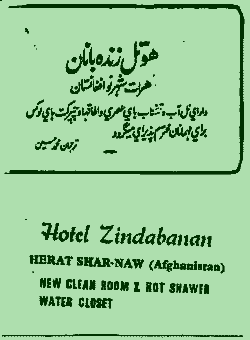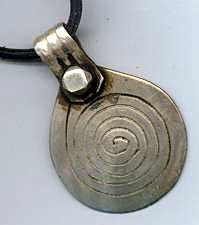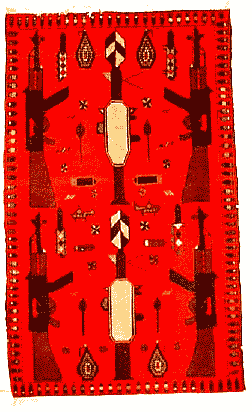|
Herati Woman and child at U.N. IDP (Internally displaced person) therapeutic feeding center outside Herat.
Courtesy of Unicef
 |
In the newspaper, I read that my beloved Herat has been abandoned. Several weeks of bombing have done what thousands of years of misery could not. In the six refugee camps around Herat there are, according to the United Nations, some 354,000 IDPs (internally displaced persons). As winter approaches, the situation becomes more severe. Last winter, 110 Herati children died in camps from extreme cold.
Poor Herat, thigh-bone of Central Asia over which tyrants have fought for 3,000 years. The center of empires, ruled by foreigners, a dismembered land. Its history a chronicle of one pillaging despot after another. Massacres, rape, plunder, enslavement, blindings, impalings, beheadings, stonings, and assassinations punctuated with lulls often more deadly still, the phrase "a period of anarchy then ensued" recurring with depressing regularity in its history, as it has over the past twenty years. First came the thuggish Soviets, paranoid that the Ayatollah’s revolution in Iran would spill over into its own Islamic states. And after they were driven out, in swooped the warlords (aka the Northern Alliance), a throwback to the marauding Mongol hordes. These gangsters were in turn pushed to northern Afghanistan by the Taliban, repressive zealots who have entangled the war-wracked Afghans in yet another endless conflict.
Hotel Zindabanan card
 |
But all of these horrors were in the future when I was in Herat; it was during a peaceful time between upheavals. The revolution that had overthrown the king—yes, him, Shah Zahir—had taken place three years earlier and the Soviet invasion was still three years hence. My main concern the night I arrived in Herat was where I would sleep that night.
Herat hotels are two-story adobes and accommodations a two-tier affair—the dirt-cheap hostels and the more costly establishments. In other words, the 25-cent and the 50-cent hotels. After more chai and considering the matter, we settled on Hotel Zindabanan. "Hot Shawer" is what clinched the deal for us. Ahh, to rinse off the dust of the road! I leave my bags at the desk and at once ask Mr. Zindabanan to direct me to the advertised shower, from which I will emerge renewed, my former self. But as I enter the contraption, I am a little dubious. For one thing, no taps. Just a rope that goes up through a hole in the ceiling. Quaint. Foreign. Oh, well, in Afghanistan they probably mix the water to the right temperature for you. I yank on the rope. Ouch! The water is freezing cold. I go downstairs.
"Uh, Mr. Zindabanan, the shower "
"Very good."
"Very cold."
"Night not good time. Try again in morning. Morning better."
He should have said at precisely 10:30 in the morning. The cistern is on the roof, and by then the sun would have heated the water to just the right temperature. An hour earlier, it would be cold, an hour later it would be scalding hot. Sorry, no cold tap.
Of course, only a barbarian infidel dog would prefer this unsightly American contraption, the shower—a pitiable solitary industrial affair really—to the glories of the hammam: the Turkish baths where a man can sweat out the grime of the world in an ancient domed steam room while conversing with one’s fellows, swim in the marble pool, and hear the latest gossip from the masseur. That’s the civilized way to cleanse both one’s soul and one’s body—and to hell with this new-fangled artificial rain machine!
Mr. Zindabanan showed us to our room: a sort of dorm of tatterdemalion youth of Europa and Asia. A couple of itinerant Pakistani engineers, hippies of German, Dutch, and Yank varieties, sitting on beds smoking joints, playing cards on the floor, chatting, strumming guitars, reading paperbacks, sleeping, practicing yoga. What a cast! But it wasn’t a play I particularly wanted to audition for.
"Uh, Mr. Zindababan," I assumed that was his name, "may we have a word?"
"Yes, yes. How may I serve you, sir?"
"Can we have another, er, smaller room?"
"So sorry, this only type room. All rooms same."
Well, nothing to be done about it really. We were exhausted anyway, and no sooner had I lain me down than I fell into a deep, dark and dreamless sleep. Around midnight, I awoke with a fierce need to visit the hotel’s other touted convenience, the water closet. Not an easy task—and watch your step!—with the tiny piece of candle supplied for the purpose. Please to know, electric turned off at nine o’clock. Why you need electric at night?
Well, sure, I see, but wasn’t this why electricity was invented in the first place? Oh, never mind. The water closet is the Existential black hole, the dark opening in the floor through which not even light can escape. It wasn’t exactly a novelty at this point. I hadn’t seen a porcelain toilet since Vienna?
 In the morning I went to see the ancient bazaar, an Ali Baba’s cave of ancient crafts, a souk of vegetable and fruit venders, tent makers, spice merchants with powdery cones of cumin, turmeric, cinnamon, coriander, peppercorns, and asafetida, honeycombs stacked to the ceiling from which oozed the pungent Herat honey, pyramids of dates, persimmons, quinces, nuts from the fertile plain of the Hari Rud Valley. Beyond them, silversmiths incising amulets on thin silver disks to ward off demons. One can’t be too careful, so I fortified myself with three ominous-looking trinkets: a magic square using Arabic numerals, a mystic spiral, and a disk with the name of Al-lah inscribed on it. In the morning I went to see the ancient bazaar, an Ali Baba’s cave of ancient crafts, a souk of vegetable and fruit venders, tent makers, spice merchants with powdery cones of cumin, turmeric, cinnamon, coriander, peppercorns, and asafetida, honeycombs stacked to the ceiling from which oozed the pungent Herat honey, pyramids of dates, persimmons, quinces, nuts from the fertile plain of the Hari Rud Valley. Beyond them, silversmiths incising amulets on thin silver disks to ward off demons. One can’t be too careful, so I fortified myself with three ominous-looking trinkets: a magic square using Arabic numerals, a mystic spiral, and a disk with the name of Al-lah inscribed on it.
Here were rug sellers crouching before vaulted alcoves with a few beautiful carpets laid out, others rolled up in stacks against the wall. With a practiced sleight of hand, the rug merchant rolls out another pattern as you pass by, one more beautiful, more saturated with the blood of plants, more tufted with woven emblems than the next. There is an etiquette to carpet buying and selling, as there is to any sort of business negotiation in the Middle East. Do you have a moment to cast your eyes, passer by, on the most humble of rugs, the tribal carpets of the nomadic Beluchi? So elegant with their geometric trees, birds, sheep, goats, camels in muted colors. Uninhibited by the Islamic prohibition on depicting people (or any other living thing), Beluchi rugs are little movies of life on the move—whatever life brings is incorporated, represented. Folktales, hunting scenes, tribal marriages, the Gate of Heaven or the Soviet invasion. Every Beluchi woman when she marries brings her family or clan’s motifs to combine with those of the family she’s moving into, hence the crowded field of images and patterns and endlessly evolving designs. Their carpets are little histories (as a nomadic people their looms are small), history as seismic wallpaper. Everything is translated into pattern, absorbed into a language that compresses even the menacing and catastrophic into a motif. In the algebra of pattern, all forms are equal. Tank, tank, tank, tank and tree, tree, tree, tree. The recent carpets made in the camps depict jet fighters, jeeps, helicopters, tanks. AK-47s and Kalishnikovs are viewed with the longue durée of life on the land. A carpet showing the arrival of Soviet troops at the gates of Herat uses tanks as a repeating border the way more traditions rugs used the ram’s horn, the tree of life, evil eye motifs.
Beluchi carpet depicting Kalishnakov rifles
 |
These fantastic carpets, even at the inflated price first mentioned, "thirty-five dollar cheap," thrown out really as a challenge, a place to start the negotiations, seem to Westerners ridiculously cheap. Let’s say you were quite happy to pay such a price and were, on impulse, to pull out your traveler’s checks in their plastic holster and say, "Great, I’ll take it." Would that make the seller happy? Not in the least. A look of utter dismay would at once fall over the man’s face. In his heart, he would murmur, "Thoughtless boor of an American, you have robbed me! You have stolen my morning! Who are you to treat me with such disrespect?" Because without much bantering, without much back-and-forthing and the joyful exchanging of jokes, of news, of gossip—what is life? What, indeed, sir, is a sale by itself? It is nothing, I tell you. It reduces a man to the tinkling of coins and the rustle of paper monies. And a pox on it, I say! Where is the ceremony of the thing, I ask you, sir? An exchange of this kind is a little celebration, is it not? Come, let us drink of the refreshing chai and of melon juices. I have cousin in Baltimore. Do you happen to know the great port of Baltimore, sir?
On into the musty depths of the bazaar. Behold! astrologers, swordsmiths, soothsayers, healers, sellers of occult potions and herbs, story tellers, calligraphers, letter writers, and match-makers (of both the long-term and more immediate varieties). "Come, Babu, just outside the walls and you will see very unexpected beauty. Clean, jolly Afghan girls. Whiskey for asking, also American cigarette."
Further on, there are musicians playing the fantastically lyrical and strange bul-bul ("bird-bird") music, harmonizing their ouds and qazhahs (lute-like fiddles) and drums to the songs of caged birds. Even as lead singers go, birds are not the most reliable divas so the music has a strange lope to it, antediluvian pauses punctuated by frantic chirping and plucking of strings—as if we were hearing the origin of music itself, blessed harmony and the Pythagorean ladder of scales taught to the ancients by the birds themselves who, having practiced their hermetic hymns for the past four million years, are masters of the Aeolian, Dorian, and Phrygian modes. And now the musicians, having deciphered the language of birds, are able, like shamans, to converse in animal languages and translate their wisdom into soothing and unearthly sounds. It is only fitting then that Herat would be the place where the Sufi saint, Farid ud-din Attar—who lived to the age of 114 lunar years (may his name increase!)—composed his masterpiece Mantiq ut-tair, the Speech of the Birds wherein are many mysteries revealed.
Richard the Lion Heart might walk through these primitive arcades and past these craftsmen practicing skills not seen in Europe since the Middle Ages and forget he’d been dead for a thousand years.
I have to confess something, patient reader. I’ve edited out the grubby modern world from these scenes, airbrushed them ever so slightly—did you suspect?—in the manner of all travelers to the East, of Pierre Loti and Maxime du Camp. I am guilty, I admit, of the sin of Orientalism (just don’t turn me in to Edward Said). All I can say is that I got carried away, a casualty of time-space vertigo, of eyeballs rushing across deserts and rummaging through the rubble of ruined cities, while memory itself, drugged by the narcotic of time, hastily summons actors and retrieves sets from remote caverns of the brain, to put on this tinted lantern show. Was it so terrible that I left out all those stalls of tawdry knickknacks, the knock-off Rolexes from Bangladesh, the knock-off Levis from Bombay, the knock-off Old Spice from god-knows-where, the electric curling irons, Japanese radios, Korean tape recorders, Czechoslovakian condoms, the posters of Sylvester Stallone, tampons, Kiss-Me-I’m-Irish t-shirts, American gum and Algerian cigarettes, and shoe-boxes of bootlegged cassettes (Peter Frampton on the cover of Comes Alive! color-Xeroxed so many times he looks like Van Gogh’s postman).
Herat is bisected by two main avenues. The rest of the city is a jumble of streets winding through ochre-colored houses that look as if they have grown out of the earth itself. The turbans and robes, the absolute timelessness of the place combines with the heat and hashish to induce a kind of delirium in which it’s easy to hallucinate oneself back in time. Babylon must have looked a little like this, Baghdad under the Caliphs, Jerusalem under Herod. You would hardly be surprised in a street like this if a scene from the Gospels were to materialize before your eyes. "And He entered into a house of a woman who was plagued with unclean spirits... " That house over there, in the Street of the Vintner. And after He had cast out the demons and come out from the house of the publican’s wife all the people gathered round Him and they marveled. The absolute rightness of the costumes and buildings, combined with the Kodachrome clarity of the light prompts an odd childhood memory. It was as if I had been here before—not a physical memory exactly, but an extremely vivid visual nostalgia. The bright shallow space of biblical dioramas in ViewMaster slides, a magical stage of optical mirages a child can enter and walk about in.
And everywhere in the streets, cheeky children, like a pack of Ali Babas following you, laughing, tugging at you, begging, "Baksheesh! Baksheesh!" offering you watches and wallets from unwary travelers. Not a scrap of garbage on the street. Nothing is wasted, you see. Tin cans are hammered flat and nailed to the doors of shops, soda bottles are reused for holding olive oil, paper folded, put in piles—for what? The Middle-Eastern fascination with bits of paper. Everyone friendly, kind, and helpful—so unlike the baleful looks one gets in other lands of Islam.
Old men sit under the shade of plane trees, each wonderful gray-bearded face looking like one of the prophets. Jonah is complaining to Amos about his recent trip to Nineveh, dour Ezekiel is going on to Habakkuk about the accommodations in Babylon this time of year, Micah is gossiping to Obadiah. "That shiksa Bathsheba! A kahbah, a whore, what can one say?" Jeremiah is grumbling to Zechariah about the way he’d been treated at the market, Daniel is telling Malachi, "You think you got problems?" and Isaiah, ecstatic and a little light-headed, holding forth about something remarkable he’d seen in the sky that morning on the slopes of the Koh-i-Baba to a group of wide-eyed madrasim. Students—or, as they say in Afghanistan, taliban.
Check back in two weeks for Part III of "An Infidel in Afghanistan."
|